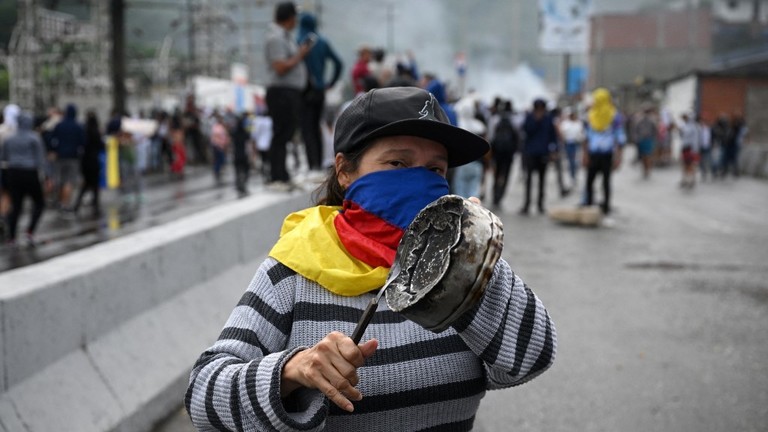Headlines
Venezuela Sees Protests Following Controversial Election

Following a controversial election, Venezuela experiences significant protests, highlighting tensions and unrest.
On Monday, after the electoral commission declared Nicolas Maduro as president for another six-year term, Venezuela experienced widespread unrest and street clashes.
The challenger’s camp alleges fraud in the voting process and asserts that their candidate, Edmundo Gonzalez, emerged victorious. Several pre-election surveys indicated a sizeable lead for him.
To prevent protesters from approaching the presidential palace, riot police and soldiers were dispatched in Caracas. Defense Minister Vladimir Padrino Lopez confirmed that more than 20 Venezuelan security personnel suffered injuries during this operation.
The government was being demanded to fall by chanting “freedom!” from crowds of people.
The video displayed torn posters of President Maduro and various objects, including tires, cars and rubbish bins set ablaze.
On Monday, Maduro delivered a speech on television from Caracas where he accused the opposition of trying to execute “a coup d’etat in Venezuela”. However, his accusations were rejected by opposition leaders who urged supporters across the nation to carry out peaceful protests.
Reportedly, demonstrators attempted to obstruct highways while Maduro delivered his speech, including one that links the capital with Simon Bolivar International Airport.
Maduro, who assumed office following the demise of President Hugo Chavez in 2013, will now serve a third uninterrupted presidential term of six years.
On Sunday, the National Electoral Council (CNE) declared that Maduro had obtained over 51% of votes while his main contender Edmundo Gonzales secured only 44%, with an estimation based on tallying about 80% of ballots.
Media reports indicate that Venezuela’s electoral authority, which the opposition believes is biased towards the ruling party, did not disclose the results from all 30,000 polling stations nationwide immediately following the vote.
The Venezuelan authorities have been urged by several countries and international organizations such as the UN to disclose voting records from specific polling stations.
Maduro’s victory was rejected by Argentina, which resulted in Venezuela withdrawing its diplomats from Buenos Aires.
In response to the international outcry, diplomats hailing from Chile, Costa Rica, Panama, Peru, the Dominican Republic and Uruguay have also been called back.
Concerns about the election results have prompted a request by nine Latin American countries for an emergency meeting of the permanent council of the Organization of American States (OAS).
